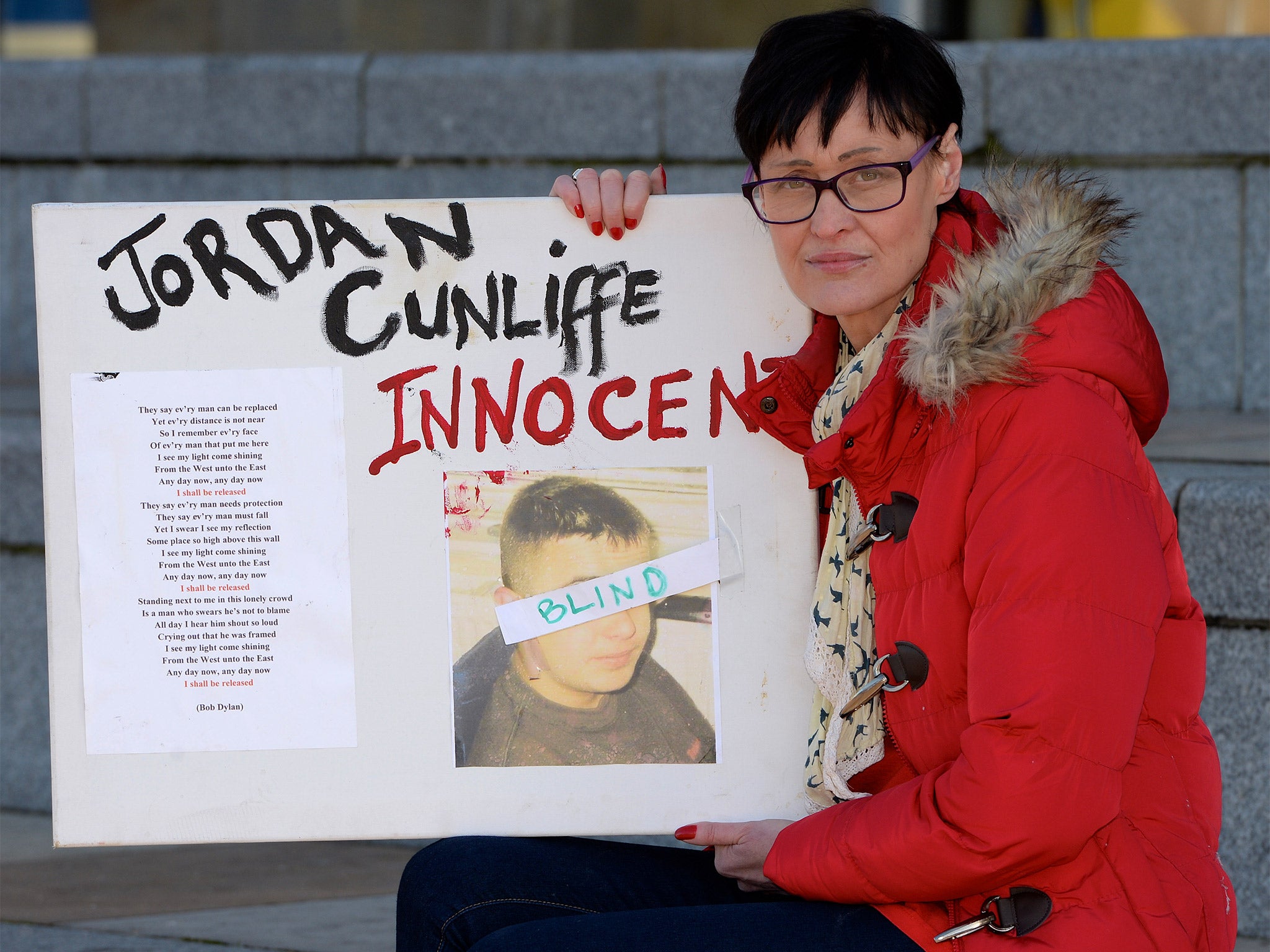Jordan Cunliffe: ‘They gave no credit to his disability. They said: if he can kick a ball, he can kill a man’
The mother of a blind teenager convicted of murder under ‘joint enterprise’ tells Helen Carter why her son is innocent

A photograph of Jordan Cunliffe is in a blue frame by the television with the word ‘smile’ picked out in silver lettering.
Janet Cunliffe doesn’t have a lot to smile about. Her son was jailed for murder seven years ago with two other teenagers under the controversial joint enterprise law - which allows someone to be convicted of a crime such as murder even if they did not inflict the fatal blow but did not prevent it.
They were convicted over Garry Newlove’s death in Warrington, Cheshire. It was a truly shocking case. Mr Newlove, a 47-year-old father of three, was kicked “like a football” by a gang of youths outside his home after confronting them over damage vehicles. He was left unconscious after suffering massive head injuries and died in hospital two days later.
Police initially arrested 25 youths in the aftermath of the killing. Three, including Jordan, who was 16 at the time, were subsquently charged with murder, convicted and sentenced to life in prison.
Jordan’s mother, however, believes that her son could never have contributed to the crime because he is registered blind and has severe keratoconus, a degenerative eye condition which distorts vision.
Jordan has always said he was not involved in the assault and was in fact several yards away, although he had been with his co-accused, Adam Swellings, then 19, and Stephen Sorton, 17, that evening.
“The prosecution never gave his eye condition any consideration during the trial,” she said. “They just said because he could kick a football, he was capable of killing a man. There was never any credit for his disability.”
His impaired vision, and the speed of the attack, means he would have had no knowledge of what was to happen, so he can’t be guilty, she argues.
Now, the Criminal Cases Review Commission (CCRC) is investigating whether to send Jordan Cunliffe’s case to the appeal court.
A series of photographs show how the murder scene would have looked with Jordan’s condition – they are considerably blurred – and have been presented to the CCRC.
Mrs Cunliffe, who lives in Wigan, said the murder came at a time when there was a “whirlpool of nastiness about being tough on crime”.
Last week, the government responded to the justice committee report on joint enterprise – which called for an urgent review into its use – saying it wouldn’t do anything before the election.
Joint enterprise is controversial because it lowers the burden of proof allowing, critics argue, innocent people to be caught up in a conviction.
For years, Mrs Cunliffe has been trying to explain the principle to people who ask about the case. It’s only since Jimmy McGovern’s film Common, inspired by the case, was screened in July that people have begun to understand it. “I just tell them about the drama and then they get what I’m talking about,” she said. “He’s such a brilliant writer.”
The character Johnjo bears a strong physical resemblance to her son.
Jordan’s younger brother, Gareth, 15, was also among those arrested by police in the aftermath of Mr Newlove’s brutal death, although he was acquitted.
Mrs Cunliffe describes the arrest of her sons as the “most terrifying time of my life” as they were both so young.
“I used to think how he must be feeling in a little room on his own. I don’t think about it any more,” she said of Jordan. “He is a man now, not a boy.”
She makes weekly visits to Buckley Hall prison in Rochdale, and they speak daily.
She said the murder happened when her sons were visiting their friends for the last time after a house move. “It should have been a farewell, but instead they said goodbye to their childhood,” she said.
Over the years, life and technology has passed Jordan by – he has no idea about Netflix, Twitter and iPhones and she fears it will be overwhelming for him if he’s released.
“He is thoughtful and intelligent and still as funny, but he’s been denied the chance to become a fuller person. He’d have gone to university, he has a fabulous brain,” she said. He sat and passed all his GCSEs in prison.
She criticises the police and Crown Prosecution Service for bringing joint enterprise cases – which, she says, are unsatisfactory to both victim’s families and the innocent people convicted. On Friday, Janet and members of Joint Enterprise Not Guilty By Association held protests in Liverpool, Leeds and London. The group supports more than 500 people who claim they were wrongly convicted of murder or manslaughter.
“Where is the justice for the families?” she said. “If I was in that situation, I’d want to know who did it.”
